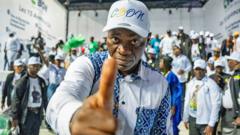The upcoming presidential election marks a significant shift in Gabon's political landscape, as the former coup leader seeks to solidify his legitimacy through democratic means and inclusive governance.
**Gabon’s Coup Leader Shifts Toward Democracy in Unusual Move**

**Gabon’s Coup Leader Shifts Toward Democracy in Unusual Move**
After a decade of military rule, Gabon prepares for a historic election as Brice Clotaire Oligui Nguema embraces democratic principles.
Little more than 19 months have passed since Brice Clotaire Oligui Nguema executed a bloodless coup that ended over five decades of Bongo family control in Gabon. Now, as Gabonese citizens prepare to head to the polls, they are witnessing a remarkable departure from the trend of military leaders who typically cling to power. Oligui Nguema, the articulate former commander of the elite Republican Guard, is the clear frontrunner in the upcoming election, scheduled for Saturday.
Dressed in a sharp suit rather than military fatigues, Oligui Nguema faces off against seven other candidates, including his main rival Alain-Claude Bilie-By-Nze, the last prime minister under the ousted President Ali Bongo. Riding a wave of popularity that stems from public desire for change and aided by electoral regulations that disqualified key challengers, the 50-year-old coup leader is expected to achieve an outright majority in the first round of voting.
His campaign slogan, which plays on his initials "C'BON," cleverly translates to "it’s good" in French, encapsulating a message of optimism. Should he secure victory, he would embark on a seven-year mandate equipped with the resources to implement substantial development and reform, a prospect appealing to a nation rich in oil and manganese, yet marred by poverty.
Oligui Nguema seized power on August 30, 2023, hours after controversial election results proclaimed that President Ali Bongo Ondimba had won a third term with 64% of the vote, leading to widespread skepticism. Bongo’s frail health and controversial political maneuvers had stoked public unrest, culminating in a military intervention celebrated by many Gabonese, who had felt imprisoned by the Bongo dynasty.
He quickly garnered support from political elites, integrating former opponents into his transitional regime and releasing political detainees. In stark contrast to other Francophone African leaders, such as those in Mali and Burkina Faso, Oligui Nguema has avoided crackdowns on dissent, focusing instead on cultivating a cooperative political atmosphere and maintaining good relations with traditional allies like France.
Under his leadership, progress has been made, including initiatives to modernize Gabon’s infrastructure and strategically manage its abundant natural resources while addressing long-standing disparities in development. Nevertheless, as the election approaches, he faces significant challenges.
Oligui Nguema must deliver on the high expectations of Gabon's citizens, who are now counting on him for tangible improvements in social development and job creation. His administration must also balance conservation efforts in relation to the vast rainforest resources while ensuring that they meet the pressing demands of urban populations who seek better living conditions.
Though Oligui Nguema’s transition has so far been well-received, the real test lies ahead, as he assumes responsibility for navigating Gabon’s complex landscape, balancing economic growth with social equity, and delivering results that satisfy the population longing for genuine change.




















